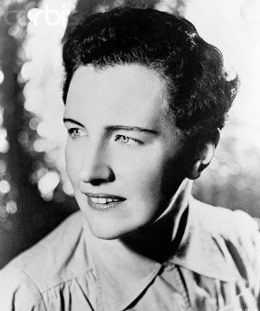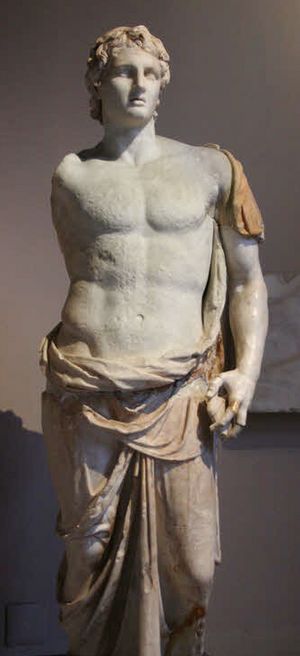Mary Renault facts for kids
Quick facts for kids
Mary Renault
|
|
|---|---|
 |
|
| Born | Eileen Mary Challans 4 September 1905 Forest Gate, Essex, England |
| Died | 13 December 1983 (aged 78) Cape Town, South Africa |
| Occupation | Writer |
| Education | St Hugh's College, Oxford |
| Period | 1939–1981 |
| Genre | Historical fiction, contemporary romance, war novel, gay literature |
| Partner | Julie Mullard (1933–1983) |
Eileen Mary Challans (4 September 1905 – 13 December 1983), known by her pen name Mary Renault (/ˈrɛnoʊlt/), was an English writer best known for her historical novels set in ancient Greece.
Born in Forest Gate in 1905, she attended St Hugh's College, Oxford, from 1924 until 1928. After graduating from St Hugh's with a Third Class in English, she worked as a nurse and began writing her first novels, which were contemporary romances. In 1948, she moved to Durban, South Africa with her partner Julie Mullard, and later to Cape Town, where she spent the rest of her life. Living in South Africa allowed her to write about openly gay characters without fearing the censorship and homophobia of England. She devoted herself to writing historical fiction in the 1950s, which were also her most successful books. She is best known for her historical fiction today.
Renault's works are often rooted in themes related to love and relationships. Her books attracted a large gay following at the time of their publication, when few mainstream works depicted homosexuality in a positive light. Her work has had a generally positive reception by critics. She has received numerous awards and honours, both during her lifetime and posthumously.
Contents
Biography
Youth and education
Eileen Mary Challans was born on 4 September 1905 at Dacre Lodge, 49 Plashet Road, Forest Gate, Essex. She was the eldest daughter of a physician Frank Challans and Mary Clementine Newsome Baxter Challans, known as Clementine. Her mother was "a desperately aspirational housewife whose favourite word was 'nice'". She had one younger sister, Francis Joyce Challans, who Mary always felt was the favourite daughter. Mary had a comfortable, yet strained childhood. Her parents had a contentious relationship, and her father was neglectful of his children. When she was 15, her aunt Bertha paid for her to be sent to a boarding school in Bristol, and then to attend the University of Oxford. As a result of entering boarding school later than most of her peers, Challans struggled to catch up in mathematics and Latin. She relied on the Loeb Classical Library to read Greek and Latin texts with English translation.
Challans was educated first at Levick Family School and Clifton Girls School in Bristol. She began attending St Hugh's College, Oxford, then an all-women's college, in 1924. While at St Hugh's, she studied history, mythology, philosophy and ancient literature. Although her studies included classical languages such as Latin, her Ancient Greek language skills were self taught. She graduated with an undergraduate degree in English in 1928. One of her tutors was J.R.R. Tolkien, who encouraged her to write a novel set in medieval times, but she burned the manuscript because she felt it lacked authenticity.
Nursing and early writing
Challan's mother hoped for her to take an interest in marriage. Following her degree, when her father refused to support her career as a writer, she left home and, to support herself, trained as a nurse. She began her training in 1933 at the Radcliffe Infirmary in Oxford. During her training she met Julie Mullard, a fellow nurse with whom she established a lifelong romantic relationship. Despite the mores of the time and the fact that Mullard had received an offer of marriage from one of her male lovers, they were determined to be a couple. They sneaked into each other's rooms at night, and on one occasion had to hide beneath the sheets when a matron burst in.
Challans worked as a nurse while writing her first novel, Purposes of Love, using the pseudonym Mary Renault to keep her writing secret should it meet with disapproval. She chose this pseudonym from Froissart's Chronicles and used it for the entirety of her professional literary career. The novel was published in 1939 by Longman in the United Kingdom, and by William Morrow and Company in the United States. After receiving a cash advance from Morrow, Challans purchased an MG sports car. Although Challans had failed her driving test, she decided to drive the car anyway along with Mullard, who also did not have a driving licence. They were involved in a road traffic accident in June 1939 which seriously injured Mullard, who was hospitalized for facial injuries. A few weeks later, the two women retreated to a small cottage in Cornwall where they lived off the income from Purposes of Love. Challans had nearly completed her second novel when World War II began. By May 1940, both Challans and Mullard had been called in to treat patients at Winford Emergency Hospital in Bristol. There, they briefly treated evacuees from the Battle of Dunkirk. Renault worked in the Radcliffe Infirmary's brain surgery ward until 1945.
Her novel The Friendly Young Ladies (1943), about a lesbian relationship between a writer and a nurse, is thought to be inspired by her relationship with Mullard. It is the only lesbian novel written by Renault.
Academic and writing career
In 1948, after winning an MGM prize worth £37,000 for Return to Night, Challans was able to leave nursing and devote herself to writing full time. Challans and Mullard emigrated to Durban, South Africa, which was home to a community of gay and lesbian expatriates who had left the more repressive environments of Britain and the United States. Because of this, Challans and Mullard were able to live together as a couple. Challans worked successfully as an author after the couple's arrival in South Africa in 1948, and continued to write until her death in 1983. In 1964, she became president of the South African chapter of International PEN, an association of writers, a position which she held until 1981. Both women were critical of the less liberal aspects of their new home, and participated in the Black Sash movement against apartheid in the 1950s. However, Challans was occasionally disillusioned with the Black Sash on account of its insufficiently radical leanings, such as when it refused to protest against the implementation of anti-homosexuality laws in 1968.
Challans travelled in Africa, Greece and Crete, but never returned to England. She had a mutual admiration for the novelist Patrick O'Brian, with whom she exchanged letters. Her earlier British reputation as a writer of sensationalist bestsellers faded, and in 1983 she was listed as one of the famous alumnae who had brought honour to the Radcliffe Infirmary Nurses' Home. Challans became ill in August 1983, and was diagnosed with lung cancer and pneumonia. In her final days she tried to complete a final novel, which remained unfinished after she went into residential hospice care. She died in Cape Town on 13 December 1983.
Chronology of writing
Beginning with Purposes of Love, Challans' first six novels had a contemporary setting. She published Return to Night in 1947. This was followed by The North Face in 1948.
Challans' last contemporary romance novel, The Charioteer (1953), marked a change in theme. It tells the story of two young gay servicemen in the 1940s who try to model their relationship on the ideals expressed in Plato's Phaedrus and Symposium. It echoed themes which Challans later revisited with her historical novels.
Between 1956 and 1981, Challans turned to historical fiction, all of which was set in ancient Greece. Challans, by then in her mid-fifties, made her first foray into historical fiction with The Last of the Wine. The novel was her greatest financial and critical success to date, and she followed it with several other historical novels. Her historical novels include a pair of novels about the mythological hero Theseus and a trilogy about the career of Alexander the Great.
Themes
Relationships
A central theme in Challans' work, both contemporary and historical, is the presentation of love as a struggle between the pursuer and the pursued. This dynamic was greatly influenced by the philosophy of Plato, in particular Phaedrus, his dialogue on love. Hierarchical relationships, involving age gaps or differences in social status, are frequently explored in Challans' novels. In her novels featuring same-sex couples, these hierarchies serve as an alternative to traditional gender roles.
Role of women
Women do not play a large role in Challans' historical fiction, and are relegated to the role of wives and mothers. They often behave in stereotypical ways, being simultaneously helpless and ruthless. Critics have remarked on the negative portrayal of women, particularly mothers, in her work. This is often attributed to the fraught relationship Challans had with her own mother. David Sweetman remarks in his biography of Challans that her novels generally portray mothers in a poor light and that, particularly in her later novels, this is extended to women in general. Daniel Mendelsohn said that both her "contemporary and the Greek novels feature unsettling depictions of bad marriages and, particularly, of nightmarishly passive-aggressive wives and mothers." Her generally negative depiction of women has also been noted by the critic Carolyn Gold Heilbrun.
Views
Challans was a Platonist, which influenced her personal views on love and relationships.
Gay liberation
Though Challans appreciated her gay following, she was uncomfortable with the "gay pride" movement that emerged in the 1970s after the Stonewall riots, and she was reluctant to identify as a lesbian. Like Laurie Odell, the protagonist of The Charioteer, she was suspicious of identifying oneself primarily by one's sexual orientation. Late in her life she expressed hostility to the gay rights movement, troubling some of her fans. Her views on the gay rights movement were elaborated upon in an afterword to The Friendly Ladies written shortly before her death in 1983.
Congregated homosexuals waving banners are really not conducive to a goodnatured 'Vive la difference!' ... People who do not consider themselves to be, primarily, human beings amongst their fellow humans, deserve to be discriminated against, and ought not to make a meal of it.
Apartheid
After relocating to South Africa in the late 1940s, Challans was involved in the anti-apartheid movement, although not as actively as many of her contemporaries. In a 1979 interview, Challans said that although she signed petitions and written protests against apartheid, she did not "pass [herself] off as a heroine. You don't get locked up for writing protests." According to Challans, she did not feel strongly compelled to write about apartheid in her novels because it made no major impact on her life, saying "I have never profited from apartheid and I have never been segregated."
See also
 In Spanish: Mary Renault para niños
In Spanish: Mary Renault para niños
- Classical reception studies
- LGBT history
- Philippics


